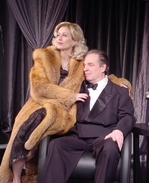SITE GUIDE
SEARCH
REVIEWS
REVIEW ARCHIVES
ADVERTISING AT CURTAINUP
FEATURES
NEWS
Etcetera and
Short Term Listings
LISTINGS
Broadway
Off-Broadway
NYC Restaurants
BOOKS and CDs
OTHER PLACES
Berkshires
London
California
New Jersey
Connecticut
DC
Philadelphia
Elsewhere
QUOTES
On TKTS
PLAYWRIGHTS' ALBUMS
LETTERS TO EDITOR
FILM
LINKS
MISCELLANEOUS
Free Updates
Masthead
Writing for Us
A CurtainUp New Jersey Review
Puma
|
You better watch out, Marlene. We all know and enjoy you, the high schtupper of Greater Berlin. But tinseltown is different. I have heard there is a morality code there and they will soon discover just how blue our blue angel is. You'd be called before a tribunal and be forced to pay attention to your husband. —Remarque
|

John FitzGibbon (Erich Maria Remarque), Yifa Edelstein (Marlene Dietrich),
|
Using Remarque (John Fitzgibbon) as their point of view character, the writers have given him the freedom to define therelationship in his own terms and through a series of flashbacks that begin when Remarque is celebrating his 65th birthday and married to film star Paulette Goddard (Natalie Wilder) but is eager to recall his first meeting with Dietrich, who was in 1937 already renowned for more than just her cinematic talent. It was her supposedly neurotically compulsive need to seduce every man and woman with whom she came in contact that comprises the main thrust of the plot, a rather one-dimensional perspective that obliterates the basic conflict between Remarque and Dietrich.
Remarque is easy prey for Dietrich (Ulfa Edelstein) who is instantly attracted to him when they meet in a café on the Lido in Venice. She has just given her mentor and Svengali, the famed film director Josef Von Sternberg, the brush-off and wastes no time, excepting to briefly acknowledge that she knows who Remarque is, to say, "Let's f..k." Before you know it, they are co-habiting in Paris. Dietrich is also married, but that's irrelevant and always has been to her.
Although Remarque, a frequenter of brothels, apparently admires Dietrich's sense of sexual freedom, he is soon openly resentful and certainly jealous of her affair with film star James Stewart (Christopher Vettel,) with whom she is filming Destry Rides Again. Dietrich is only too happy to share with Remarque "shmutz" (dirt) about all the Hollywood stars ("Betty Grable was under the table with the Marx Brothers") before jumping into bed with him. Set designer Jessica Parks has created an attractive neon-lights enhanced Art Deco bedroom that serves both the playwrights and the occupant's needs.
As there is no discernable arc to the plot, one relies on the quick-dissolve scenes and the terse to torpid dialogue for compensation. The play's funniest scene has Remarque discovering Stewart with Dietrich in her bedroom and how Stewart sweet-talks his way out. One has to admire Vettel's Saturday Night-Live-like performance as Stewart despite the fact that he looks and sounds for the world like Van Johnson. In scene after scene, we see Dietrich treating Remarque like "shmutz," but that only seems to increase his ardor. Ironically, this presumably and unwittingly recalls the relationship in The Blue Angel, (Der Blaue Engel), the 1930 German film directed by Sternberg that brought her to the attention of an American film studio.
Edelstein, who doesn't look or sound like Dietrich or even begins to insinuate her as a moving image, seems perfectly at home with whatever impersonation it is that she is doing. There are many moments during which Fitzgibbon, during his trips down memory lane, looks to be on the verge of pulling his hair out. This is perfectly understandable. And thanks to the miracle of wigs, Wilder appears as Remarque's first wife Jutta, as well as the widowed socialite Gloria Hatrick McLean who becomes Mrs. James Stewart.
Film buffs will enjoy all the name-dropping -- Olivia de Havilland, Charles Chaplin, and John Barrymore — and also get a bang (no pun intended) out of the occasionally funny line; for example, Remarque asks, "Why don't we make a child?" To which Dietrich replies, "Out of the question. I have a child. I have a husband who has a mistress. I can't think about extending my family." In real life, Dietrich was commended for entertaining the American troops during World War II. It is only fitting that I commend director Suzanne Barabas for effectively turning this otherwise dramatic embarrassment into the kind of light diversion calculated to please many in the audience.
|
Puma By Julie Gilbert and Frank Evans Directed by SuzAnne Barabas Cast: John FitzGibbon (Erich Maria Remarque), Yifa Edelstein (Marlene Dietrich), Natalie Wilder (Jutta Remarque, Paulette Goddard, Gloria Stewart), Chirstopher Vettel (James Stewart, Immigration Officer) Scenic Design & Properties: Jessica Parks Lighting Design: Jill Nagle Costume Design: Patricia E. Doherty Sound Design: Merek Royce Press Running Time: 2 hours 30 minutes including intermission New Jersey Repertory Company, 179 Broadway, Long Branch, NJ (732) 229 - 3166 Tickets ($40.00) Performances: Thursdays, Fridays at 8 PM; Saturdays at 3 PM and 8 PM; Sundays at 2 PM. Opened 02/26/11 Ends 04/03/11 Review by Simon Saltzman based on performance 02/26/11 |
|
REVIEW FEEDBACK Highlight one of the responses below and click "copy" or"CTRL+C"
Paste the highlighted text into the subject line (CTRL+ V): >Feel free to add detailed comments in the body of the email and state if you'd like your comments published in our letters section. . .also the names and emails of any friends to whom you'd like us to forward a copy of this review. You can also contact us at Curtainup at Facebook or Curtainup at Twitter and Curtainup's Blog Annex |





